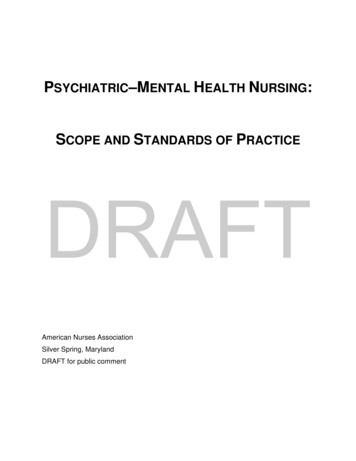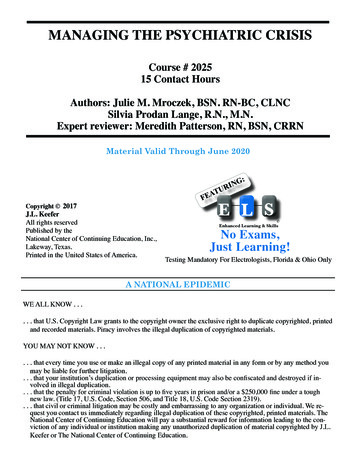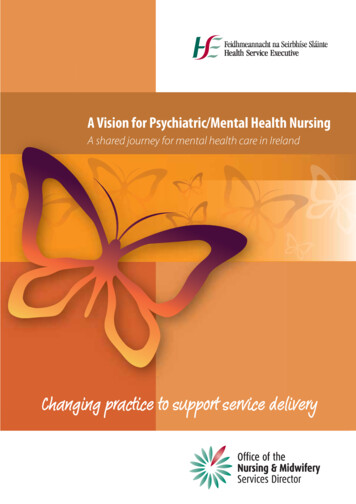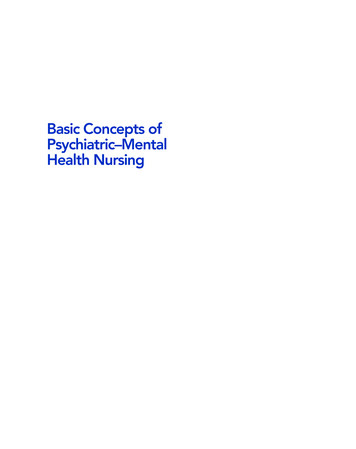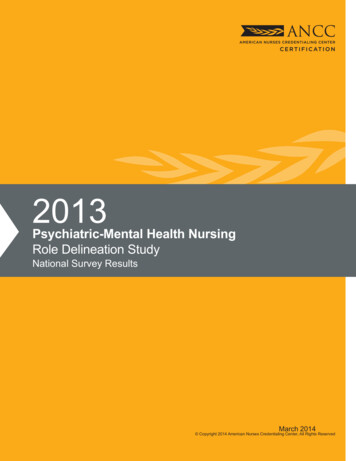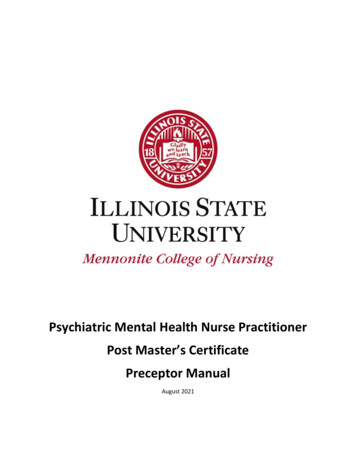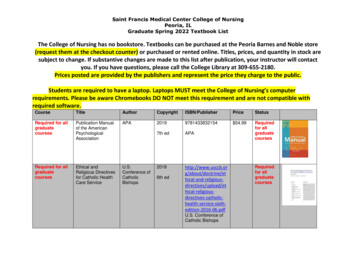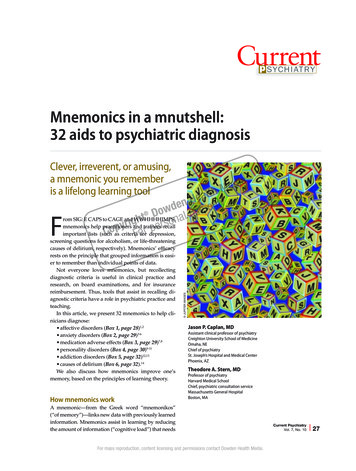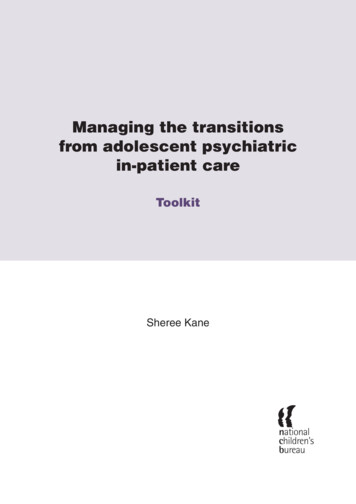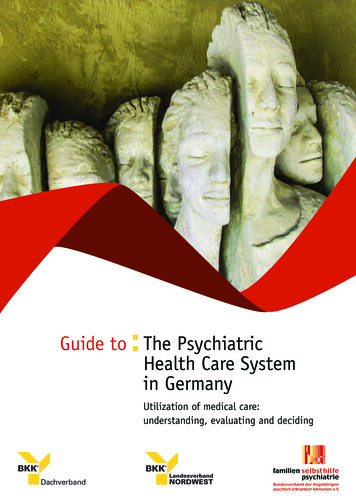
Transcription
Guide to The PsychiatricHealth Care Systemin GermanyUtilization of medical care:understanding, evaluating and deciding
Federal association for relatives of mentally ill persons (Registered Organization)Bundesverband der Angehörigen psychisch kranker Menschen e.V. (Publisher)Dr. Caroline Trautmann, Christian Kleißle, Christoph MüllerGuide toThe PsychiatricHealth Care Systemin GermanyUtilization of medical care:understanding, evaluating and deciding
Guide toCopyrightsPublisherFamilien-Selbsthilfe PsychiatrieBundesverband der Angehörigen psychisch kranker Menschen e.V.Family self-help psychiatryFederal association for relatives of mentally ill persons (registered organization)Oppelner Str. 130, 53119 BonnEditorial departmentDr. Caroline Trautmann, Christian Kleiße, Christoph MüllerComposition, designMarkus Lau Hintzenstern, Astrid Hellmundt, BerlinTitle designMarkus Lau Hintzenstern, based on a design from Mlap Studio / shutterstock.com,using a photo from dimitrisvetsikas1969 / pixabay.comPhotos, Illustrationspixabay.com, Wikipedia; Montages: mlhIt was not possible to determine the source to all photos and illustrations usedin this brochure. If you know the source for a photo or an illustration, please letus know so that we can contact the rights holders.Edition Autumn 2017Supported by(Company HealthInsurance Fund –Umbrella Association)4(Company HealthInsurance Fund –State AssociationNorth-West)
The Psychiatric Health Care System in GermanyContentsGreetings 6General information on the health care system 7When the soul loses its balance 8What is a medical treatment certificate andan electronic health insurance chip card? 9Language barriers in psychiatric and psychotherapeutic care 10What does psychiatric anamnesis / psychiatric diagnostics mean? 11Consultation hours at reception centers 13Consultation hours at outpatient institutes 13Established psychiatrists 14Established psychological psychotherapists 14Acute psychiatric care in clinics 15What is a psychosocial counselling center and where can I find one? 16Pharmacy 16Oral medication and depot medication 17Advice for relatives on dealing with persons after traumatic experiences 18Appendix – Psychosocial Centers in Germany 19“Experts in Their Own Cause” 25The Regional Associations of the Relatives of Mentally Ill People 265
Guide toGreetingsDear fellow citizens!Ever since you came to Germany from your home country, you surely often experienceeveryday life as strange and odd. Here, the daily interaction is organized very differently from how you know it. Sometimes, this is difficult to understand as we hearover and over again when speaking with affected people.Caring of people who are mentally ill happens differently here than in your homecountry. That this is confusing you is understandable for us. That is why we verymuch care about to give you some orientation with this guide. Use this guide as ahint to possibly find the appropriate support for the situation you or your relativesare in.Especially for people who are confronted with the psychiatric care in Germany forthe first time, the system appears to be incomprehensible and unclear. Assistance isnecessary, so that you can find your way around the system. Companions are needed, who stand by and take care that all the right answers are given in situations ofdistress. Please regard us, the Federal association for relatives of mentally ill persons(BApK e.V.), as the ones who look after you so that you can stay on the right track –as an affected person or as a relative.With this in mind, we wish you and your relatives all the best on your way to recovery.Gudrun SchliebenerHead of the BApK e.V.(Bundesverband der Angehörigen psychisch erkrankter Menschen e.V.)Autumn 20176
The Psychiatric Health Care System in GermanyGeneral information on the health care systemOne thing is clear: someone who falls physically or mentally ill in Germany, definitely receives medical help. Basically, the health care system in Germany stands on thefoundation of the insurance companies. However, as a refugee, you are not necessarilyinsured. Your health care is ensured by the social welfare offices or the health department of the city or the district you live in.Locally, it is regulated differently, how medical care for refugees is organized. Insome cities or districts, a health care insurance chip card of the insurance company isprovided for you. In other regions, you will have to collect a medical treatment certificate at the responsible offices with which you can visit a family doctor or a specialist. Sometimes, medical and nursing professionals come into the facilities of refugeeaid and render every assistance on site, unbureaucratically and uncomplicated. Nobody who suffers physically or mentally will be excluded from being offered help.ImportantPlease, always keep all health records. If you havebrought documents from home, please keep them.Stay thorough with all medical papers you receive inGermany. For the physicians, the information contained is important information for the continuation ofyour treatment.7
Guide toWhen the soul loses its balanceWhen you have the feeling that your soul is losing balance, do not hesitate acceptsupport. In countries and cultures where you come from, dealing with mentally illpersons is even more shame tainted than in Germany. For the social community, themisbalanced soul is a taboo.In Germany, there is a diverse and extensive psychiatric care system which can offeryou support. For emergencies, there are psychiatric clinics and outpatient departmentsnationwide that can help you. There is standard care in psychiatric specialist practicesand psychotherapeutic practices. This system is supplemented with a so called complementary care system which offers diverse opportunities of access. In this context, youwill be confronted with terms like day care clinic, day care center or outpatient departments.ImportantFind the courage to speak to the social or voluntaryrefugee aid worker in the facilities or the neighborhood. Certainly, the necessary help will be found foryou.8
The Psychiatric Health Care System in GermanyWhat is a medical treatment certificate andan electronic health insurance chip card?Depending on the federal state, the district or the municipality, you get an electronichealth insurance chip card or a medical treatment certificate before being allowed toreceive health care services.The medical treatment certificate can be collected at local public authorities and isvalid for three months. This certificate legitimizes the doctor’s visit. When the doctorrefers you to a hospital or prescribes medication, the local authority must be immediately informed about that.Medical treatment certificatefor refugeesThe electronic health care insurance chip card (Fig. 2) substitutes the medical treatment certificate. You must keep it safe like a bank card. It makes the access to thehealth care system easier because you do not need go to the local authority office forevery necessary treatment beforehand.Electronic healthinsurance chip card9
Guide toLanguage barriers in psychiatric and psychotherapeutic careDue to the influx of refugees and many other migration movements, there are oftenlanguage barriers in the psychiatric and psychotherapeutic care. These barriers willmake it more difficult for you to get to a feeling of togetherness with the treatingdoctors and psychologists. In this tense situation you find yourself, it will be difficultto build a relationship of trust towards people.The fact that you are meeting a person that knows neither your language nor thecultural characteristics of your home country, makes guidance difficult, of course. Inpsychiatric clinics, there is often linguistic support by the staff, sometimes also by atranslator or translation services via modern media. We would like to present to yousome translation programs for your smartphone or other devices:For Apple anslate.comFor Android deviceshttp://www.nyxcore.comFor all other deviceshttp://www.speak-and-translate.comWhen you have a trusted person, who can accompany you to a psychiatrist and speaksGerman, a least a little, then bring them along.Every now and then, there is the challenge that relatives or other people around youare causing the illness or part of the disease incident. If this is the case, being accompanied by them does not make sense. You must be sure that the person accompanyingyou translates the truth.Only to limited extent, you will meet people in psychiatric clinics or specialist practices who will have the same language skills or cultural socialization as you do. Capacities for a treatment in your mother language are limited.10
The Psychiatric Health Care System in GermanyWhat does psychiatric anamnesis/psychiatric diagnostics mean?Doctors have the responsibility for diagnoses and the resulting treatment. They giveprescriptions, refer persons to clinics and decide the possibilities after a diagnosis. Atthis point, you will be physically examined.Physical examinationof a patient:auscultation (left) andblood pressuremeasurement (right)In the psychiatric context, the doctors will work with psychopathologic findingswhich inform about your symptoms. A psychopathological finding is a result basedon conversations with you and your relatives (personal and external anamnesis). Theperson’s motivation and mood, orientation and the experienced world are being examined carefully and in detail. Psychiatrists take blood and cerebrospinal fluid samplesfrom your nerve tracts and induce laboratory tests. It is a routine examination duringwhich certain parameters are being tested and which will give information about psychiatric diseases.11
Guide toIn the course of instrumental diagnostics, psychiatrists conduct electro-encephalograms (EEG) or imaging techniques (computer tomography CT, magnet resonanceimaging MRI).The EEG measures your brain activity by fixing electrodes to the head for a short time.The CT or MRI is comparable to an X-ray examination in which changes in brain anatomy or brain activity are visualized. A physical examination completes the procedure.Electro-encephalogram (EEG)Computer tomography (CT)(Magnet resonance imagingonly differs in technologynot in the appearance of thedevice)12
The Psychiatric Health Care System in GermanyConsultation hours at reception centersRather unbureaucratic are medical consultation hours in reception centers. Physiciansfrom direct vicinities organize consultation hours on site. German authorities have theresponsibility to cover the costs. That is how a psychiatric specialist will visit you athome.Consultation hours at outpatient institutesPsychiatric outpatient institutes are part of hospital care. You have to make an appointment to talk about your hardships and suffering. Visiting an outpatient instituteis comparable to a consultation at a doctor’s office. In many regions, the psychiatricoutpatient institutes take over the function of specialist practices because the supplyby medical specialists differs from region to region.ImportantNormally, it is necessary to make an appointment ina psychiatric outpatient institute. In cases of emergency, it can be waived.13
Guide toEstablished psychiatristsEstablished psychiatrist usually treat you outside of a crisis. You can get an appointment there. The treating psychiatrist has the possibility to get an impression of treatment procedures. When necessary, he or she will adjust the dose of prescribed medication or make other suggestions which will lead to a reduction or recovery of yourmental illness. The main focus of this medical action is pharmacotherapy, the treatment with medication.Psychiatrists are strictly bound by medical confidentiality. For you as an affected person, this means a high level of trust and confidentiality. What happens between youand the practitioner stays between the two of you.ImportantPlease regard yourself as an active part of the treatment. The more reflective and motivated the psychiatrist perceives you, the more expedient guidance canbe structured. The affected person’s as well as theirrelative’s participation increases the accuracy andsuccess of the intervention.Established psychological psychotherapistsEstablished psychotherapists work independently in their own offices. They focus onconversation therapy. According to their subject area, they make suggestions concerning various intervention possibilities. They are also bound by medical confidentiality.In contrast to the selective visits at specialists’ offices, a psychotherapy requires continuity. This means an enormous willingness on your part, e.g. to visit the psychotherapist on a weekly basis.Psychotherapies last for many months up to years. As a refugee, it is more difficult butnot impossible to get a psychotherapy approved. It is often a very exhausting under14
The Psychiatric Health Care System in Germanytaking when you are working on biographical experiences and conditionings during apsychotherapy. But experiences show that it is worth the effort. During conversationtherapies, you can talk about topics you have often been silent about in your life.Acute psychiatric care in clinicsPsychiatric hospitals have a clear organizational structure. This structure looks like thefollowing:Full inpatient careA mentally ill person’s full inpatient care happens in a clinic. This means that you arein the clinic 24 hours a day. There, you spend the day at the ward with one to twodozen other people. You eat at the ward. You sleep at the ward. During the day, severaltherapy possibilities will be offered to you. It makes sense to do a full inpatient carenot only during a crisis but also after a crisis. Inside the psychiatric clinics, there isusually a separation between open and closed wards. In which one you will be treateddepends on your condition.Semi inpatient careThe day care clinic belongs to the semi inpatient offers of a psychiatric clinic. Youspend the days there with other people, comparable to a workplace. In the evenings,you are with your familiy again respectively in your accommodation. This has the advantage that the mentally ill person’s recovery can happen under authentic and everyday life conditions. You are also in your familiar environment at weekends. The purpose of semi inpatient care is primarily to structure the day and to follow the affectedperson’s daily routine as much as possible.Outpatient careOutpatient care of a psychiatric clinic includes the outpatient department and theoutpatient psychiatric care. The outpatient department rather has a “you-come-to-us”policy which puts your autonomy in focus. You will be given great trust.The outpatient psychiatric care follows the please-go-there-principle which goes by theaffected person’s condition. What kind of outpatient offers are available in your region, the clinic can surely tell you.15
Guide toWhat is a psychosocial counselling center and where can Ifind one?Some carriers of welfare or charities offer support at psychosocial counselling centers.These offers cannot be found nationwide. They are not the appropriate contact pointin times of a mental crisis. The fact that these psychosocial counselling centers workculturally sensitively and also provide a wide range of language skilled personnel, maketheir therapeutic value and work useful.The psychosocial counselling centers have opportunities in the area of psychotherapyand consultation as well as social work for refugees who are traumatized by persecution, torture, imprisonment, war, but also who suffer because of the escape or arementally ill.PharmacyWhen the psychiatrist prescribes you medication, he or she will give you a prescription. With this prescription, you can go to the pharmacy and you will get medication.As long as you have the status of a refugee, you do not have to pay any extra costs.However, with an orderly employment it must be checked to what extend you have topay fees.If you should need a pharmacy at weekend, you don’t have to worry about being without help. There is an emergency system of pharmacies. There are individual pharmacies in city district or regions which are open around the clock. The pharmacy closestto you usually informs via a generally accessible notice where the next emergencypharmacy is located.16
The Psychiatric Health Care System in GermanyOral medication and depot medicationThere is medication which you have to take in as pills or drops, once up to severaltimes a day. It is very important that you take it regularly. The doctor assumes regularintakes. When doctors see you at visits at the outpatient department or practices, theywill form an opinion about your condition. They will determine the dose of the medication by their personal impression, mutual conversations and the collected laboratoryresults. It is crucial that you inform the specialist how you are coping with the medication.Depot medication will be given via an intramuscular injection. This has the advantagethat you do not have to pay attention to the daily intake of medication. If you receive a neuroleptic treatment due to a psychosis, the depot injection is the method ofchoice. Another advantage is that you have to visit the doctor’s office or the outpatient department in regular intervals (every one to four weeks.)ImportantPlease make a decision that makes you feel comfortable. Take care of you. Your body and soul sendsyou signals what does you well. There is no right orwrong.17
Guide toAdvice for relatives on dealing with persons aftertraumatic experiencesAs a relative, you can – above all – support the affected persons by being a companionalong the path and offering necessary help. It makes sense to function as a conversation partner and go through all distress with the person concerned. But you have tobe aware of your own limits. Do not go beyond your own possibilities. Because you arepart of the mentally ill person’s system, you are emotionally involved in any case. Thisrestricts you and your opportunities.Information about the illness are the first step to evaluating the mentally ill person’speculiarities and therefore to start dealing with them. Is the traumatized person getting the imagination of having to relive the horrible experience again, it becomes yourtask to go through this bad experience with them.Surely, you can always offer help. But do not forget to sustain the ill relative’s autonomy and independency. Do not hesitate to draw the line when you do not feel comfortable with the situation. Talk about the perceived helplessness and the lack of understanding for the mentally suffering person. There is no reason to be ashamed aboutthe own or a relative’s mental illness. It does not help anyone if you lose the groundunderneath your feet because of overload.The local health care system offers support for the relatives of mentally ill people. Onthe one side, relatives can call attention that they need some relief. Use the opportunity of a treatment/cure, so an ill relative can be treated in short-term care. Uponconsultation, mostly the costs are covered by the insurance company. Because of theself-help movement, many possibilities of relief can be financed simultaneously. Trygetting into contact with the local relative association or organization.As a self-help association, we offer support for relatives and affected persons via the“SoulFone”. We can even offer help in the Arabic language. Further information onwww.bapk.de18
The Psychiatric Health Care System in GermanyAppendixPsychosocial Centers in GermanyPSZ Aachen – Psychosoziales Zentrum für Flüchtlinge(Psycho Social Centre for Refugees) in der Städteregion Aachen(PÄZ Aachen e.V.)Mariahilfstraße, 16, 52062 AachenPhone: 0241 49000, Fax: 0241 49004,E-Mail: paez.ac@t-online.de und Psz.ac@gmx.de, Web: www.paez-aachen.de/psz.htmlDiakonisches Werk Altenkirchen – Fachdienst für Flüchtlinge und Migranten,Psychosoziales Zentrum für Flüchtlinge (Special service for Refugees and Migrants,Psycho Social Centre for Refugees)Stadthallenweg 16, 57610 AltenkirchenPhone: 02681 800820, E-Mail: liebmann@dw-ak.de, Web: diakonie-altenkirchen.de/pszZentrum Überleben gGmbH, GSZ Moabit, Haus K Eingang C, 3. OGTurmstraße, 21, 10559 BerlinPhone: 030 3039060, Fax: 030 30614371,E-Mail: info@ueberleben.org, Web: www.ueberleben.orgXENION Berlin – Psychosoziale Hilfen für politisch VerfolgtePaulsenstraße 55/56, 12163 BerlinPhone: 030 3232933, Fax: 030 3248575,E-Mail: info@xenion.org, Web: www.xenion.orgBehandlungsstelle für traumatisierte Flüchtlinge (Care Centre for traumatizedRefugees), Fürstenwalde, c/o KommMit e.V., Haus K, Eingang D, 2. OG linksTurmstraße, 21, 10559 BerlinPhone: 030 98353731, Fax: 030 98353914,E-Mail: m.misselwitz@kommit.eu, Web: 2%80%9Ckfb.htmlPSZ Bielefeld – Psychosoziales Zentrum für Flüchtlinge (Psycho Social Centre forRefugees), (Ev. Krankenhaus Bielefeld gGmbH und AK Asyl e.V.)Friedenstraße 4-8, 33602 BielefeldPhone: 0521 787-15246, Fax: 0521 787-15293,E-Mail: dallwitz@ak-asyl.info, Web: www.psz-nrw.de/psz-netzwerk/psz-bielefeld/,Flyer: Z-Bielefeld.pdf19
Guide toMFH Bochum – Medizinische Flüchtlingshilfe (Medical Aid for Refugees) e.V.Dr.-Ruer-Platz 2, 44787 BochumPhone: 0234 9041380, Fax: 0234 9041381,E-Mail: info@mfh-bochum.de, Web: www.mfh-bochum.deREFUGIO Bremen – Psychosoziales Zentrum für ausländische Flüchtlinge(Psycho Social Centre for foreign Refugees) e.V.Außer der Schleifmühle 53, 28203 BremenPhone: 0421 3760749, Fax: 0421 3760722,E-Mail: info@refugio-bremen.de, Web: www.refugio-bremen.dePsychosoziales Zentrum für Flüchtlinge (Psycho Social Centre for Refugees) DortmundLange Straße 44, 44137 DortmundPhone: 0231 88088114, E-Mail: psz@awo-dortmund.deSächsischer Flüchtlingsrat e.V.Dammweg 5, 01097 DresdenPhone: 0351 4692607, Fax: 0351 4692508,E-Mail: info@saechsischer-fluechtlingsrat.de, Web: www.saechsischer-fluechtlingsrat.dePsychosoziales Zentrum für Flüchtlinge (Psycho Social Centre for Refugees) DüsseldorfBenrather Straße 7, 40213 DüsseldorfPhone: 0211 54417322, Fax: 0211 54417320,E-Mail: info@psz-duesseldorf.de, Web: www.psz-duesseldorf.derefugio thüringen – Psychosoziales Zentrum für Flüchtlinge(Psycho Social Centre for Refugees) e.V., Standort ErfurtFriedrich-Schiller-Straße 44, 99096 ErfurtPhone: 0361 60268079, Fax: 0361 74429566,E-Mail: pszf-erfurt@refugio-thueringen.de, Web: www.refugio-thueringen.deEv. Zentrum für Beratung und Therapie am Weißen Stein(Centre for Councelling and Therapy at Weißer Stein)Olof-Palme-Straße 17, 60439 Frankfurt/MainPhone: 069 5302-222, Fax: 069 5302-294,E-Mail: anne.rottlaender@frankfurt-evangelisch.de,Web: www.frankfurt-evangelisch.de/91.htmlFATRA Frankfurt/M. – Frankfurter Arbeitskreis Trauma und Exil e.V.Berger Straße 118, 60316 Frankfurt/MainPhone: 069 499174, Fax: 069 498526,E-Mail: info@fatra-ev.de, Web: www.fatra-ev.de20
The Psychiatric Health Care System in GermanyPro Asyl – Bundesweite Arbeitsgemeinschaft für Flüchtlinge(Federal Working Collective for Refugees) e.V.Postfach 160624, 60069 Frankfurt/MainPhone: 069 230688, Fax: 069 230650,E-Mail: proasyl@proasyl.de, Web: www.proasyl.dePsychosoziales Zentrum für Asylsuchende und MigrantInnen(Psycho Social Centre for Asylum Seekers and Migrants) in Vorpommern,im Kreisdiakonischen Werk Greifswald e.V.Kapaunenstraße 10, 17489 GreifswaldPhone: 03834 2311269, Fax: 03834 2311265,E-Mail: psz@kdw-greifswald.de, Web: www.psz-greifswald.dePSZ für Flüchtlinge (Psycho Social Centre for Refugees) Diakonie Mark-RuhrBergstraße 121, 58095 HagenPhone: 02331 30646-2047, Fax: 02331 30646-2048,E-Mail: psz-hagen@diakonie-mark-ruhr.de, Web: tinyurl.com/y87hjoosPsychosoziales Zentrum für Migrantinnen und Migranten(Psycho Social Centre for Migrants) Sachsen-Anhalt,Standort Halle (Saale)Charlottenstraße 7, 06108 Halle (Saale)Phone: 0345 2125768,E-Mail: kontakt@psz-sachsen-anhalt.de, Web: www.psz-sachsen-anhalt.dehaveno, Gesundheitszentrum (Health Care Centre) St. Pauli, Haus 5Seewarterstraße 10, 20459 HamburgPhone: 040 31793535, Fax: 040 31186951, E-Mail: info@haveno.de, Web: www.haveno.deSEGEMI, Seelische Gesundheit Migration und Flucht(Mental Health Migration and Flight) e.V.Adenauerallee 10, 20097 HamburgE-Mail: info@segemi.org, Web: www.segemi.orgNetzwerk für traumatisierte Flüchtlinge in Niedersachsen(Network for traumatized Refugees) e.V.Marienstraße 28, 30171 HannoverPhone: 0511 85644514, Fax: 0511 85644515,E-Mail: info@ntfn.de, Web: www.ntfn.de21
Guide torefugio thüringen – Psychosoziales Zentrum für Flüchtlinge(Psycho Social Centre for Refugees) e.V., Standort JenaFerdinand-Lassalle-Straße 8, 07743 JenaPhone: 03641 226281, Fax: 03641 238198,E-Mail: koordination@refugio-thueringen.de, Web: www.refugio-thueringen.deTherapiezentrum für Folteropfer (Therapy Centre for Victims of Torture) des Caritasverbandes für die Stadt Köln e.V.Spiesergasse 12, 50670 KölnPhone: 0221 16074-0, Fax: 0221 1390272,E-Mail: therapiefolteropfer@caritas-koeln.de, Web: tinyurl.com/tzfofPsychosoziales Zentrum für Geflüchtete (Psycho Social Centre for Refugees) Leipzig,Mosaik Leipzig –Kompetenzzentrum für transkulturelle Dialoge e.V.Peterssteinweg 3, 04107 LeipzigPhone: 0341 92787712, psz@mosaik-leipzig.de, www.mosaik-leipzig.dePsychosoziales Zentrum (Psycho Social Centre) Dresden,CALM Sachsen (das Boot gGmbH)Friedrichstraße 28a, 01067 DresdenPhone: 0351 26440090, E-Mail: psz.dresden@das-boot-ggmbh.de,Web: www.calm-sachsen.de/de/psz-dresdenExilio Lindau – Hilfe für Flüchtlinge und Folterüberlebende(Help for Refugees and Survivours of Torture) e.V.Reutiner Straße 5, 88131 LindauPhone: 08382 409450, Fax: 08382 409454,E-Mail: info@exilio.de, Web: www.exilio.deDiakonie Pfalz – Psychosoziales Zentrum (Psycho Social Centre) Pfalz, LudwigshafenWredestraße 17, 67059 LudwigshafenPhone: 0621 49077710, E-Mail: psz-pfalz@diakonie-pfalz.de, Web: www.diakonie-pfalz.dePsychosoziales Zentrum für Migrantinnen und Migranten(Psycho Social Centre for Migrants) Sachsen-Anhalt,Standort MagdeburgKarl-Liebknecht-Straße 55, 39114 MagdeburgPhone: 0391 63109807, Fax: 0391 50676985,E-Mail: kontakt@psz-sachsen-anhalt.de22
The Psychiatric Health Care System in GermanyCaritasverband Mainz e.V. – Psychosoziales Zentrum für Flucht und Trauma(Psycho Social Centre for Flight and Trauma), MainzRheinallee 3a, 55116 MainzPhone: 06131 907460, E-Mail: beratungszentrum@caritas-mz.de,Web: aumaCaritasverband für die Region Rhein-Mosel-Ahr e.V. IN TERRA –Psychosoziales Zentrum für Flüchtlinge (Psycho Social Centre for Refugees), MayenSt.-Veit-Straße 14, 56727 MayenPhone: 02651 98690, E-Mail: goepfert-m@caritas-mayen.de,Web: www.caritas-rhein-mosel-ahr.deREFUGIO München – Beratungs- und Behandlungszentrum für Flüchtlinge und Folteropfer(Consultation and Care Centre for Refugees and Victims of Torture) e.V.Rosenheimer Straße 38, 81669 MünchenPhone: 089 9829570, Fax: 089 98295757,E-Mail: office@refugio-muenchen.de, Web: www.refugio-muenchen.deRefugio Münster – Psychosoziale Flüchtlingshilfe (Psycho Social Help for Refugees)Hafenstraße 3-5, 48153 MünsterPhone: 0251 1448631, Fax: 0251 1448634,E-Mail: info@refugio-muenster.de, Web: www.refugio-muenster.dePsychosoziale Anlaufstelle für Geflüchtete (Consultation Centre for Refugees)Am Alten Kirchhof 12, 24534 NeumünsterPhone: 04321 24488, Fax: 04321 24219,E-Mail: bzm@diakonie-altholstein.de, Web: fstelle-fuer-GefluechtetePSZ Nürnberg – Psychosoziales Zentrum für Flüchtlinge (Consultation Centre for Refugees)St.-Johannis-Mühlgasse 5, 90419 NürnbergTel: 0911 39363-62, Fax: 0911 39363-61,E-Mail: buellesbach.charlotte@rummelsberger.net, Web: ychosoziales-zentrum/IBIS – Interkulturelle Arbeitsstelle e.V.,Klävemannstraße 16, 26122 OldenburgPhone: 0441 884016 (Zentrale); 0441 9849605 (Verwaltung und Geschäftsführung);0441 39038943 (Deutsch, Arabisch, Kurdisch, Farsi, Dari);0441 39063323 (Deutsch, Englisch, Französisch),Fax: 0441 9849606, E-Mail: info@ibis-ev.de, Web: www.ibis-ev.de23
Guide toGesellschaft für Inklusion und Soziale Arbeit (Society for Inclusion and Social Work) –ISA e.V., FaZIT – Fachberatungsdienst Zuwanderung, Integration und ToleranzZum Jagenstein 3, 14478 PotsdamPhone: 0331 9676250, Fax: 0331 9676259, E-Mail: info@fazit-brb.de, Web: www.bbzberlin.dePSZ Saarbrücken – Psychosoziales Beratungszentrum des Deutschen Roten Kreuzes(Psycho Social Consultation Centre of the German Red Cross)Vollweidstraße 2, 66115 SaarbrückenPhone: 0681 9764254, Fax: 0681 9764290,E-Mail: psz@lv-saarland.drk.de, Web: http://tinyurl.com/lv-sl-pszPBV Stuttgart – Psychologische Beratungsstelle für politisch Verfolgte und Vertriebene(Psychological Consultation Centre for politically persecuted persons)Schloßstraße 76, 70176 StuttgartPhone: 0711 2854450, Fax: 0711 2054499507,E-Mail: pbv@eva-stuttgart.de, Web: ologische-beratungsstelle-pbvRefugio Stuttgart e.V. – Psychosoziales Zentrum für traumatisierte Flüchtlinge(Psycho Social Centre for traumatized Refugees)Weißenburgstraße 13, 70180 StuttgartPhone: 0711 6453127, Fax.: 0711 6453126,E-Mail: info@refugio-stuttgart.de, Web: www.refugio-stuttgart.deÖkumenische Beratungsstelle für Flüchtlinge(Ecumenical Consultation office for Refugees), Trier,Landkreise: Trier, Trier-Saarburg, Bitburg-Prüm, Bernkastel-Wittlich, Rhein-HunsrückKreis (VG Kirchberg, VG Kastellaun, VG Simmern)Dasbachstraße 21, 54292 TrierPhone: 0651 9910600, E-Mail: fluechtlingsberatung@diakoniehilft.de,Web: f%C3%BCr-fl%C3%BCchtlinge/BFU Ulm – Behandl
The Psychiatric Health Care System in Germany 7 General information on the health care system One thing is clear: someone who falls physically or mentally ill in Germany, definite-ly receives medical help. Basically, the health care system in Germany stands on the foundation of the insurance

